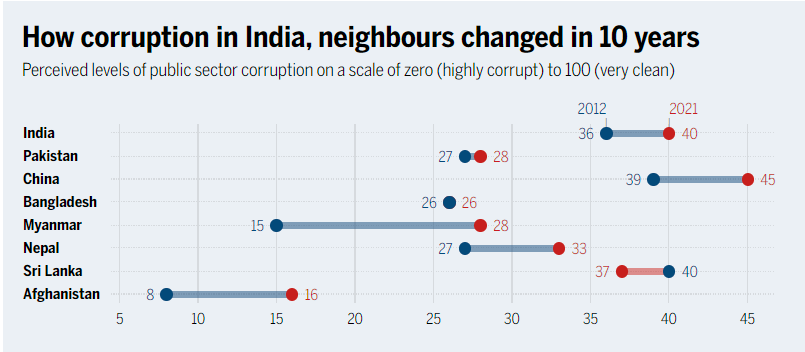Corruption Perception Index 2021
Context:
Recently, the Corruption Perception Index (CPI) 2021 was released by Transparency International.
Relevance:
GS-II: Polity and Governance
Dimensions of the Article:
- What is the Corruption Perceptions Index (CPI)
- Highlights of Corruption Perceptions Index (CPI) 2021
- Recommendations of the Corruption Perceptions Index (CPI)
What is the Corruption Perceptions Index (CPI)
- The Corruption Perceptions Index (CPI) is an index published annually by Berlin-based Transparency International since 1995 which ranks countries “by their perceived levels of public sector corruption, as determined by expert assessments and opinion surveys.”
- The Index ranks 180 countries and territories by their perceived levels of public sector corruption according to experts and businesspeople.
- It relies on 13 independent data sources and uses a scale of zero to 100, where zero is highly corrupt and 100 is very clean.
- The CPI generally defines corruption as “the misuse of public power for private benefit”.
- A study published in 2012 found a “very strong significant correlation” between the Corruption Perceptions Index and two other proxies for corruption: black market activity and an overabundance of regulation.
Highlights of Corruption Perceptions Index (CPI) 2021
Overall, the CPI shows that control of corruption has stagnated or worsened in 86% of countries over the last decade.
Top performers:
This year, the top countries are Denmark, Finland and New Zealand, each with a score of 88. Norway (85), Singapore (85), Sweden (85), Switzerland (84),
Bottom Performers:
South Sudan (11), Syria (13) and Somalia (13) remain at the bottom of the index.
India’s Performance:

- India ranked 85 among 180 countries in the current index (86 in 2020 and 80 in 2019).
- Transparency International gave India a CPI score of 40.
- Except Bhutan, all of India’s neighbours are ranked below it. Pakistan dropped 16 spots in the index and was ranked at 140.
Recommendations of the Corruption Perceptions Index (CPI)
- Strengthen oversight institutions to ensure resources reach those most in need. Anti-corruption authorities and oversight institutions must have sufficient funds, resources and independence to perform their duties
- Ensure open and transparent contracting to combat wrong doing, identify conflicts of interest and ensure fair pricing.
- Defend Democracy, Promote Civic Space by enabling civil society groups and the media to hold governments accountable.
- Publish relevant data and guarantee access to information to ensure the public receives easy, accessible, timely and meaningful information.
-Source: The Hindu




